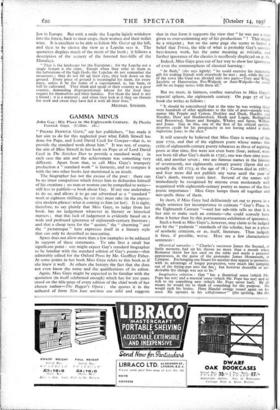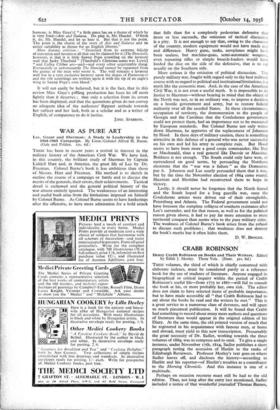GAMMA MINUS
John Gay : His Place in the Eighteenth Century. By Phoebe Fenwick Gaye. (Collins. i8s.)
" PHOEBE FENWICK GAYE," say her publishers, " has made it her aim to do for this neglected poet what Edith Sitwell has done for Pope, and Lord David Cecil for Cowper—that is, to provide the standard work about him." It was not, of course, the aim of Miss Sitwell in her book on Pope or of Lord David Cecil in The Stricken Deer to provide a standard work ; in each case the aim and the achievement was something very different. Apart from that, to call Miss Gaye's trumpery production a " standard work " is fantastic, and to compare it with the two other books just mentioned is an insult.
The biographer has not the excuse of the poet : there can be no inner compulsion which forces him to disburden himself of his creations ; no man or woman can be compelled to write— still less to publish—a book about Gay. If any one undertakes to do so,- and allows it to go out advertised as a " standard " work at eighteen shillings, he (or she) must take (in the expres- sive modern phrase) what is coming to him (or her). It is right, therefore, to say plainly that Miss Gaye, to judge from her book, has no judgement whatever in literary or historical matters ; that this lack of judgement is evidently based on a wide and profound ignorance of eighteenth-century literature ; and that a cheap taste for the " quaint," the " charming " and the " picturesque " here expresses itself in a literary style that can only be described as nauseating.
Space does not allow more than a few examples to be adduced in support of these statements. To take first a small but significant point : one might expect Gay's standard biographer to be familiar with the standard edition of Gay's poems—that admirably edited for the Oxford Press by Mr. Geoffrey Faber. At some points in her book Miss Gaye refers to this book as if she knew it well. At others she betrays the fact that she does not even know the name and the qualifications of its editor.
Again, Miss Gaye might be expected to be familiar with the quotation (in itself celebrated enough) which has for 200 years stood on the title-page of every edition of the chief work of her chosen author—The Beggar's Opera : she quotes it in the unheard of form Non haec novimus esse nihil and suggests that in that form it supports the view that " he was not a man given to over-estimating any of his productions " ! This might be a misprint ; but on the same page she seems to betray a belief that Trivia, the title of what is probably Gay's second- best-known work, has the same meaning as, trivialia, and further ignorance of the classics is needlessly displayed on p. 6o.
Indeed, Miss Gaye goes out of her way to show her ignorance of even the commonplaces of classical learning :
" At Bath," (she says lightly) " he could exercise his inimitable gift for making friends with everybody he met ; and, while the rest of the town like Gaul was divided into two parts—Tory and Whig, Jacobite or Hanoverian, Pro-Walpole or Anti-Walpole--he could still be on happy terms with them all."
But we must, in fairness, confine ourselves to Miss Gave's especial sphere, the eighteenth century. On page 57 of her book she writes as follows : " It should be remembered that at the time he was writing there were hundreds of other applicants to the title of poet—people with names like Popple and Cotton, Dodsley and Duck, Hurdlis r.nd Needier, Dyer and Huddersford, Monk and Logan, Bedingfield and Brerewood, Smart and Straight, Whaley and Sprat, Wilkins and Jones. Gay in this, one of the first of his critical epistles deserves credit for his perspicacity in not having added a mute inglorious Jones to the elect."
It will scarcely be believed that Miss Gaye is writing of the year 1712, and that of the eighteen poets whose names this critic of eighteenth-century poetry rehearses as those of aspiring poets at that time, five were not even born (four, indeed, were not born till after Gay's death in 1732), one was then nine years old, and another seven ; two are famous names in the history of seventeenth, not eighteenth, century poetry (Sprat did not actually die till 1713, at the age of 78 ; Cotton died in 1687) ; and four more did not publish any verse until the year of Gay's death, twenty years later. Several of the names will immediately be recognised by anyone even moderately well acquainted with eighteenth-century poetry as names of the first poetic importance : Miss Gaye lumps them all together and mis-spells three of them.
In short, if Miss Gaye had deliberately set out. to prove in a single sentence her incompetence to estimate " Gay's Place in the Eighteenth Century "—and her sub-title tells us that it is her aim to make such an estimate—she could scarcely have done it better than by this portmanteau exhibition of ignorance.
Such a book as Miss Gaye's, however, may claim to be judged not by the " pedantic " standards of the scholar, but as a piece of aesthetic criticism, or as, itself, literature. Thus judged, it fares, if possible, worse. Here are a few characteristic sentences :
Historical narrative : " Charles's successor James the Second, of futile memory, had sat his throne no more than a month when Romance threw her last card on the table and made a personal appearance, in the guise of the pretender James Monmouth, at Lympne. Exchanging one Stuart for another may appear to posterity, with its advantage of longer perspective, very much like jumping out of the frying-pan into the fire ; but however desirable or un- desirable the change was not to be."
Imaginative criticism : Gay " has a theatrical sense (which Mr. Pope has not) and a musical sense (which Mr. Pope has not) and an itch to try something new (which Mr. Pope never had). By all means he would try to think of something for the purpose. He would rack his brains. Here Handel swings round again on his stool. He upstairs in his schlafstimmer" [the spelling, like the humour, is Miss Gaye's] "a little piece has on a theme of which he is very fond—Ads and Galatea. Do play it, Mr. Handel. 0 feteh it, do, Mr. Handel, and let us hear it. But that is not the point. The point is the charm of the story of Acis and Galatea and its entire suitability as theme for an English libretto."
More literary criticism : " Detached from its extreme felicity of execution and invention all that can be claimed for it (The Dunciad), however, is that it is little Sawny Pope scrawling on the lavatory wall that Jacky Theobald " [Theobald's Christiamname was Lewis] ".and Colley Cibber are—and—and every other unprintable thing: Fortunately or unfortunately The Dunciad cannot be separated from the genius of the man who wrote it. The wall remains a lavatory wall but in a very exclusive lavatory upon the slopes of Parnassus— and the vile scrawlings are written upon it with the tip of an eagle's wing in Sawny Pope's own blood."
It will not easily be believed, but it is the fact, that in this review Miss Gaye's piffling production has been let off more lightly than it deserves ; that only a selection from its errors has been displayed, and that the quotations given do not convey an adequate idea of the authoress' flippant attitude towards her subject and her lack, both as a scholar and as a writer of English, of competence to do it justice.
JOHN SPARROW.



















































 Previous page
Previous page